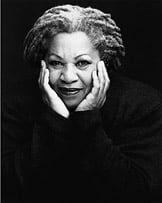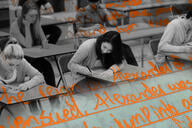You have /5 articles left.
Sign up for a free account or log in.

Toni Morrison
Princeton University
Columbia University's Literature Humanities course, long a key part of undergraduate education at the university, has been hailed for teaching the students the classics of Western civilization, but also criticized for its focus on dead white men (with a few dead white women added from time to time). That has changed this month, with the addition of a novel by Toni Morrison, who doesn't fit any part of "dead white men."
Columbia faculty members say they hope a shift in curriculum will help to make a course with roots in classical texts become more accessible to students.
Morrison’s novel Song of Solomon was officially added to the Literature Humanities curriculum for the upcoming academic year. It is the first work by a living black author, and by one of only a handful of female authors, including Virginia Woolf and Jane Austen. Students will read Morrison last during their time in the course, after they have grappled with the likes of Homer, Plato, Dante, Shakespeare and Dostoevsky, among others.
Julie Crawford, an associate professor of English and comparative literature and the chair of Literature Humanities course committee, said faculty in the past had had the option to add a later 20th century text to their own class, but this is the first time that all of the roughly 1,200 students taking the course will be reading the same contemporary work.
She said the choice of Morrison, who is a professor emerita at Princeton University, was unsurprising because she was among the most internationally read and lauded authors on the shortlist of late-20th-century and early-21st-century works created by a subcommittee and voted on by the Literature and Humanities faculty. Twenty of the 52 voting professors ranked it as their top choice to add to the curriculum.
The review of the syllabus takes place every three years and involves reading thousands of student evaluations to determine which texts are working for students, which ones are not and what other changes might need to take place on the syllabus.
Students will begin the year with reading classic works, including epics, plays and poems, from ancient Greece and Rome, and then move onto novels from post-Christian Europe. Morrison’s Song of Solomon is also the first from an American writer to make the list.
Crawford said that while the students may not look the same or come from the same backgrounds as the characters in the texts they read, the undergraduates find other ways to relate to the pieces. The yearlong course is just one of the six classes undergraduates at Columbia are required to take as part of their core curriculum, meaning even students in disciplines like engineering, who wouldn’t necessarily take a literature course, are exposed to the lessons.
“Part of the brilliance of the experience is understanding that our rubrics have changed -- they not always have been this way,” Crawford said.
The course came under fire in an editorial in the university newspaper this spring that gained major media coverage. Four student members of Columbia’s Multicultural Affairs Advisory Board wrote the piece, claiming that the curriculum was unrepresentative of the student body and could exclude some who wanted to share thoughts but were afraid to because of the content.
"These texts, wrought with histories and narratives of exclusion and oppression, can be difficult to read and discuss as a survivor, a person of color or a student from a low-income background," the students wrote.
Crawford disputed this argument, saying that it was possible for students to relate to other characteristics of those immortalized in the works studied. She said as the student body becomes more diverse and international (11 of her 22 students last year were international students), the curriculum changes to reflect that, but so do the discussions in the classes.
“I think for many people it’s very radically exciting to interact with people who aren’t like you or [who] hold beliefs that are radically different than the ones you either hold or have rejected,” she said. “That looking for the self, it’s certainly something we should all do, but it’s not best done by looking in a mirror.”
Thomas Nelson Laird, an associate professor at the School of Education at Indiana University at Bloomington who has studied diversity in the higher education curriculum, said as colleges and universities consider changes to their curriculum, they have to strike a balance between covering the classics and introducing newer works that can still be considered “great books.”
He said the kind of core required learning and teaching that takes place at Columbia is unusual, but with it comes a debate over what constitutes a great work and what is worth the students’ and faculty’s time and effort.
“The kind of really good work out there continues to grow, but curriculum is bound by time and other things, so if there were 20 great things to read 100 years ago, now there are 50,” Nelson Laird said. “So institutions have to make very difficult choices.”
He added that students will often request more contemporary readings to be introduced because they have difficulty relating to the older pieces, or can’t understand the curriculum not including someone from a group with their characteristics.
“It’s a refrain we’ve heard from students for centuries -- ‘the curriculum’s not relevant enough in my life,’” he said. “More and more we’re hearing that they relate more to stuff from yesterday than from 10 or 15 years ago.”




